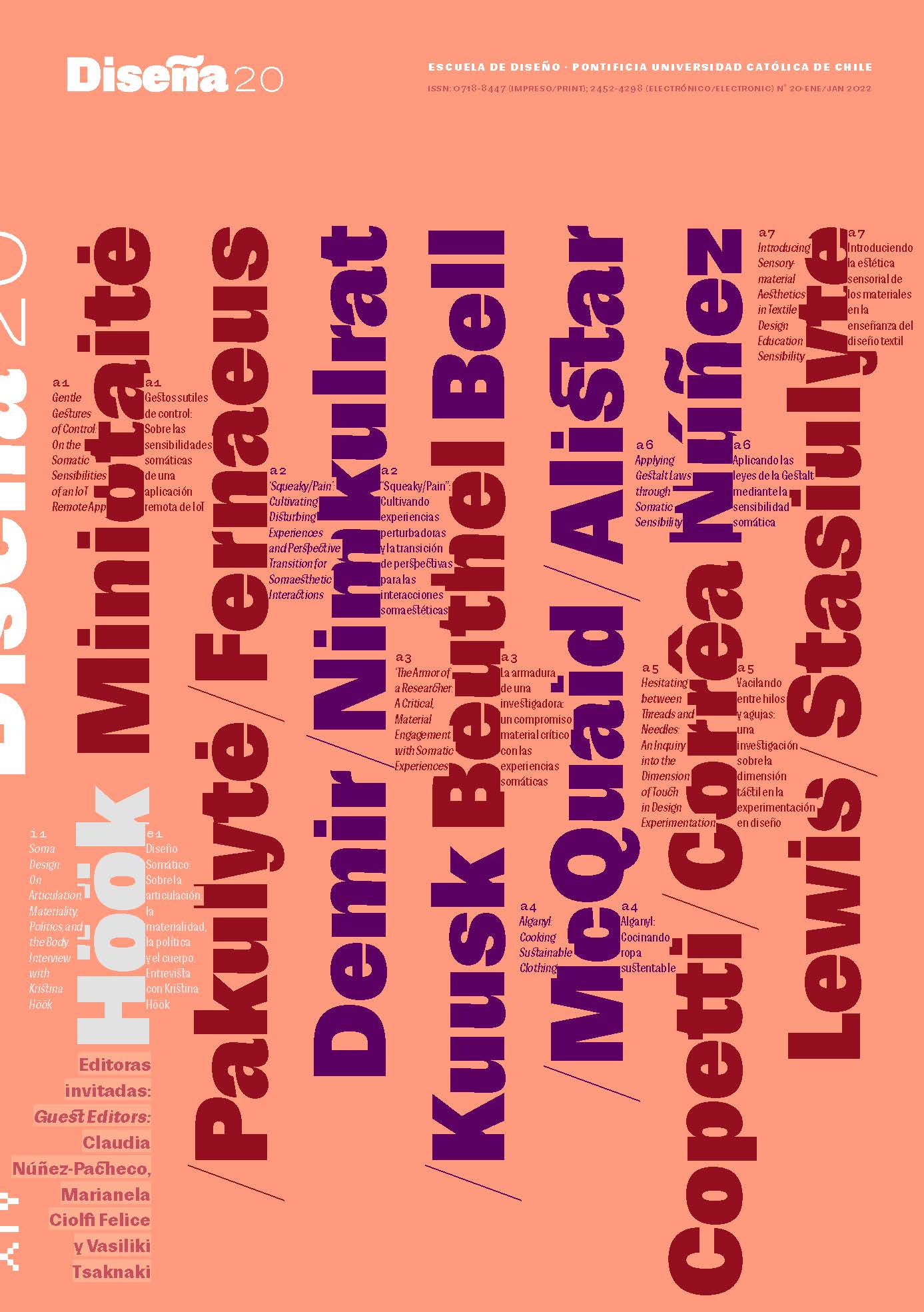Design and Somatic Sensibilities
Main Article Content
Abstract
Cultivating somatic sensibilities involves heightening our sensory appreciation as a path to devise meaningful multisensory experiences in interaction design. Immersed in an increasingly digitalized and data-centric world, research projects centering on the sensory, embodied, and material reality of our experience, might start losing momentum. On the other hand, the pandemic has also transferred our labs from the public nature of our workshop room to the intimacy of our homes, bringing unexpected benefits and challenges. The articles included in this issue center on the sensory and material experiences of designers, who work with design methods that foreground somatic modes of inquiry and show how these changes could open a door for new opportunities to emphasize the importance of embodied and somatic practices in design and HCI.
Downloads
Article Details

This work is licensed under a Creative Commons Attribution-ShareAlike 4.0 International License.

This work is licensed under a Creative Commons Attribution-ShareAlike 4.0 International license.
COPYRIGHT NOTICE
All contents of this electronic edition are distributed under the Creative Commons license of "Attribution-ShareAlike 4.0 Internacional" (CC-BY-SA). Any total or partial reproduction of the material must mention its origin.
The rights of the published images belong to their authors, who grant to Diseña the license for its use. The management of the permits and the authorization of the publication of the images (or of any material) that contains copyright and its consequent rights of reproduction in this publication is the sole responsibility of the authors of the articles.
References
Alfaras, M., Tsaknaki, V., Sanches, P., Windlin, C., Umair, M., Sas, C., & Höök, K. (2020). From Biodata to Somadata. Proceedings of the 2020 CHI Conference on Human Factors in Computing Systems, Article 555. https://doi.org/10.1145/3313831.3376684
Balaam, M., Comber, R., Clarke, R. E., Windlin, C., Ståhl, A., Höök, K., & Fitzpatrick, G. (2019). Emotion Work in Experience-Centered Design. Proceedings of the 2019 CHI Conference on Human Factors in Computing Systems, 1–12. https://doi.org/10.1145/3290605.3300832
Balaam, M., Woytuk, N. C., Felice, M. C., Afsar, O. K., Ståhl, A., & Søndergaard, M. L. J. (2020). Intimate Touch. Interactions, 27(6), 14–17. https://doi.org/10.1145/3427781
Buchenau, M., & Suri, J. F. (2000). Experience Prototyping. Proceedings of the 3rd Conference on Designing Interactive Systems: Processes, Practices, Methods, and Techniques, 424–433. https://doi.org/10.1145/347642.347802
Campo Woytuk, N., Søndergaard, M. L. J., Ciolfi Felice, M., & Balaam, M. (2020). Touching and Being in Touch with the Menstruating Body. Proceedings of the 2020 CHI Conference on Human Factors in Computing Systems, Article 344. https://doi.org/10.1145/3313831.3376471
Ciolfi Felice, M., Søndergaard, M. L. J., & Balaam, M. (2021). Resisting the Medicalisation of Menopause: Reclaiming the Body through Design. Proceedings of the 2021 CHI Conference on Human Factors in Computing Systems (pp. 1–16). https://doi.org/10.1145/3411764.3445153
Haraway, D. (1995). Situated Knowledges: The Science Question in Feminism and the Privilege of Partial Perspective. In A. Feenberg & A. Hannay (Eds.), Technology and the Politics of Knowledge (pp. 175–194). Indiana University Press.
Helms, K. (2019). Do You Have to Pee? A Design Space for Intimate and Somatic Data. Proceedings of the 2019 on Designing Interactive Systems Conference, 1209–1222. https://doi.org/10.1145/3322276.3322290
Höök, K. (2018). Designing with the Body: Somaesthetic Interaction Design. MIT Press.
Höök, K., Eriksson, S., Louise Juul Søndergaard, M., Ciolfi Felice, M., Campo Woytuk, N., Kilic Afsar, O., Tsaknaki, V., & Ståhl, A. (2019). Soma Design and Politics of the Body. Proceedings of the Halfway to the Future Symposium 2019, 1–8. https://doi.org/10.1145/3363384.3363385
Loke, L., & Robertson, T. (2013). Moving and Making Strange: An Embodied Approach to Movement-Based Interaction Design. ACM Transactions on Computer-Human Interaction, 20(1), Article 7. https://doi.org/10.1145/2442106.2442113
Loke, L., & Schiphorst, T. (2018). The Somatic Turn in Human-Computer Interaction. Interactions, 25(5), 54–5863. https://doi.org/10.1145/3236675
Lupton, E., & Lipps, A. (Eds.). (2018). The Senses: Design Beyond Vision. Princeton Architectural Press.
Márquez Segura, E., Turmo Vidal, L., Rostami, A., & Waern, A. (2016). Embodied Sketching. Proceedings of the 2016 CHI Conference on Human Factors in Computing Systems, 6014–6027. https://doi.org/10.1145/2858036.2858486
Merleau-Ponty, M. (1962). Phenomenology of Perception (C. Smith, Trans.). Routledge.
Nicolescu, B. (2014). Methodology of Transdisciplinarity. World Futures, 70(3–4), 186–199. https://doi.org/10.1080/02604027.2014.934631
Núñez-Pacheco, C. (2022). Dialoguing with Tangible Traces: A Method to Elicit Autoethnographic Narratives. ACM TEI Tangible, Embedded and Embodied Interaction (TEI ’22). https://doi.org/10.1145/3490149.3502255
Núñez-Pacheco, C., & Loke, L. (2018). Towards a Technique for Articulating Aesthetic Experiences in Design using Focusing and the Felt Sense. The Design Journal, 21(4), 583–603. https://doi.org/10.1080/14606925.2018.1467680
Núñez-Pacheco, C., & Loke, L. (in press). Focusing for Interaction Design: An Introspective Somatic Method. CHI Conference on Human Factors in Computing Systems (CHI ’22). https://doi.org/10.1145/3491102.3501978
Popova, K., Garrett, R., Núñez-Pacheco, C., Lampinen, A., & Höök, K. (in press). Vulnerability as an Ethical Stance in Soma Design Processes. ACM CHI Conference on Human Factors and Computer Systems (CHI ‘22). https://doi.org/10.1145/3491102.3501994
Puig de la Bellacasa, M. (2017). Matters of Care: Speculative Ethics in More than Human Worlds. University of Minnesota Press.
Schiphorst, T. (2011). Self-evidence: Applying Somatic Connoisseurship to Experience Design. CHI ’11 Extended Abstracts on Human Factors in Computing Systems, 145–160. https://doi.org/10.1145/1979742.1979640
Schleicher, D., Jones, P., & Kachur, O. (2010). Bodystorming as Embodied Designing. Interactions, 17(6), 47–51. https://doi.org/10.1145/1865245.1865256
Schön, D. A. (1987). Educating the Reflective Practitioner: Toward a New Design for Teaching and Learning in the Professions. Jossey-Bass.
Ståhl, A., Tsaknaki, V., & Balaam, M. (2021). Validity and Rigour in Soma Design-Sketching with the Soma. ACM Transactions on Computer-Human Interaction, 28(6), 38:1-38:36. https://doi.org/10.1145/3470132
Tsaknaki, V., Jenkins, T., Boer, L., Homewood, S., Howell, N., & Sanches, P. (2020). Challenges and Opportunities for Designing with Biodata as Material. Proceedings of the 11th Nordic Conference on Human-Computer Interaction: Shaping Experiences, Shaping Society, 1–3. https://doi.org/10.1145/3419249.3420063
Turmo Vidal, L. (2021). Designing for Intercorporeality: An Interaction Design Approach to Technology-Supported Movement Learning [Doctoral Dissertation, Uppsala University]. https://www.diva-portal.org/smash/record.jsf?pid=diva2%3A1590421&dswid=1650
Windlin, C., Ståhl, A., Sanches, P., Tsakna-Ki, V., Karpashevich, P., Balaam, M.-L., & Höök, K. (2019). Soma Bits -Mediating Technology to Orchestrate Bodily Experiences. Article 25. https://doi.org/10.6084/m9.figshare.7855799.v2
Zweistra, C. A. (2019). Closing the Empathy Gap: Technology, Ethics, and the Other [Doctoral Dissertation, Delft University of Technology]. https://doi.org/10.4233/uuid:7cf71865-bdff-4c72-b3d7-c6d464594fd6

